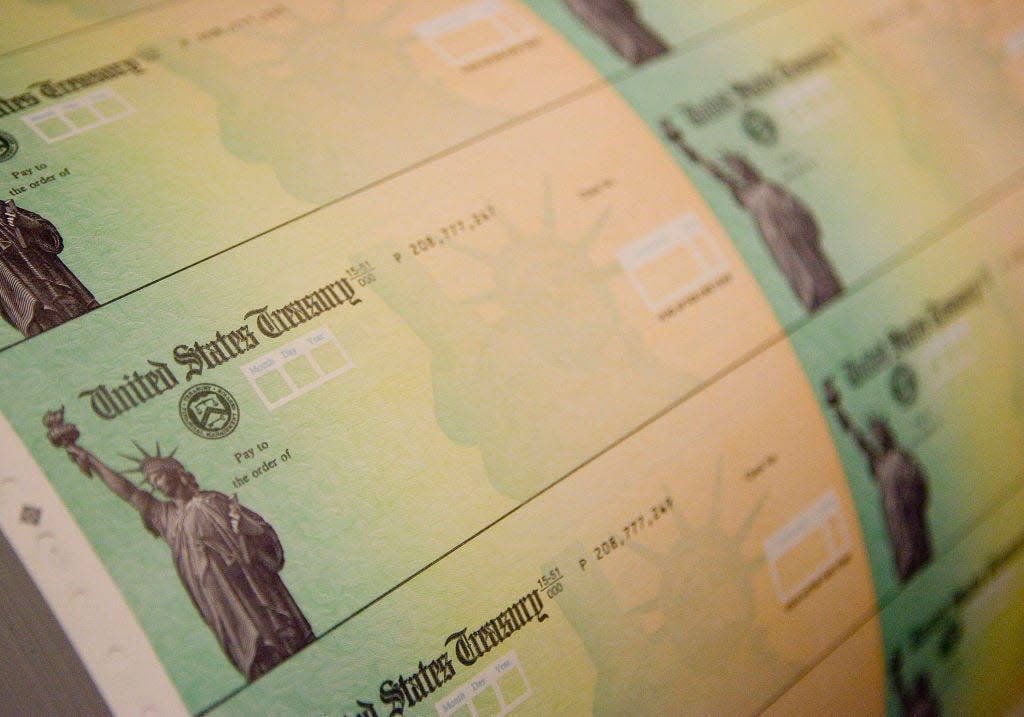What Trump's comments about ceasing stimulus-package negotiations mean for future $1,200 payments — in 1 minute or less

- Oops!Something went wrong.Please try again later.
While Trump said that stimulus talks should end immediately, that doesn't mean another $1,200 check is off the table.
Both Senate Republicans and House Democrats have brought forward second stimulus plans, but none have been signed into law.
Trump's recent comments decrease the likelihood of a speedy resolution resulting in a round of $1,200 payments being sent out before the election.
On Tuesday, President Donald Trump sent out a series of tweets instructing his team to cease stimulus negotiations until after the election.
Trump said that the Senate should instead focus on confirming his Supreme Court pick, Amy Coney Barrett.
Meanwhile, Americans who had been following the months-long stimulus negotiation talks, hoping that a resolution would be reached before the election, could only watch as the news impacted the stock market and questions swirled.
To bring you up to speed on the latest, we've recapped what it all means for those hoping for another round of direct payments sooner rather than later — and summarized the timeline that led up to this point.
What it all means for a second round of $1,200 direct payments
In short, the likelihood of a further delay in any further rounds of direct payments just increased.
While the promise of a second check is not dead yet, the road toward a speedy resolution just took a hard left turn. Unless Trump switches toward supporting a deal instead of a pause on negotiation talks, any timeline toward a deal that would result in direct payments has likely been extended even further.
So how did we get here? For those looking to understand how this all fits into the broader events of the last seven months, here are the key developments leading up to the president's statements on Tuesday.
March
On March 25, the Senate passed the Coronavirus Aid, Relief, and Economic Security (CARES) Act, which provided funds for PPE for healthcare workers, loans for small businesses, and unemployment benefits. The $1,200 stimulus checks and extra $600/week in benefits were a result of the bill.
July
On July 31, the benefits lapsed without a follow-up deal, and the $600/week payments ended amid fierce disagreements between Republicans and Democrats. The $1,200 checks had been sent out, and recipients has already used the funds.
August
On August 8, Trump allocated $44 billion to FEMA for grants that would allow states to continue to pay out a weekly unemployment benefit if they applied for grant money. Every state besides South Dakota applied for the funds.
September
Negotiations around a possible follow-up deal continued. Both House Democrats and Republicans brought forward various plans, but they failed to reach a deal by the beginning of the month.
On September 8, Republicans proposed a stimulus package with a $300/week unemployment benefit through December 27, though it excluded second round of direct payments. Democrats blocked the bill, saying it was insufficient.
Speaker Nancy Pelosi criticized the plan saying, "Senate Republicans appear dead-set on another bill which doesn't come close to addressing the problems and is headed nowhere."
Negotiations between Pelosi and Treasury Secretary Steven Mnuchin restarted, and he later said that no bill would pass without another $1,200 check included.
October
On October 1, House Democrats passed a plan that would include another $1,200 check, and a $600/week unemployment benefit through January. The plan faced an uncertain future though, as it would still require Senate approval.
This brings us to Tuesday night, when Trump said that any and all stimulus talks should end immediately, but he would sign a stand-alone bill for another round of $1,200 checks.
The instructions made the status of the ongoing negotiations between Speaker Pelosi and Treasury Secretary Steven Mnuchin uncertain.
Read the original article on Business Insider

